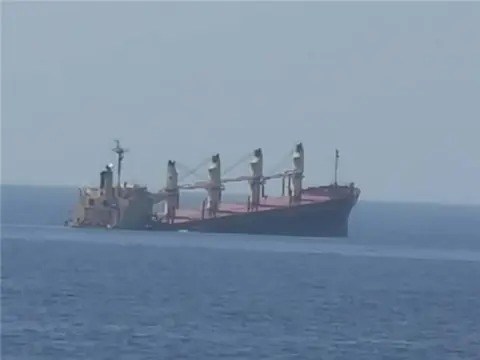A British registered vessel, the Rubymar, reportedly attacked by Houthi fighters in the Red Sea, has been confirmed to have sustained damage but remains afloat.
This revelation contradicts initial claims made by Houthi sources on Monday, asserting the sinking of the ship, marking a significant turn in the ongoing series of maritime assaults plaguing the region since November.
According to the findings by BBC Verify, obtained images of the Rubymar depict the vessel still above water as of Wednesday, refuting assertions of its demise.
The ship, owned by Blue Fleet Group, was reportedly struck by missiles near the Bab al-Mandab strait, resulting in damage to its engine room and deck.
Despite listing and abandonment by the crew, the vessel remains afloat and is being towed to Djibouti for further assessment.
The persistence of attacks on ships in the Red Sea, despite military actions by the US and UK against Houthi forces in Yemen, underscores the ongoing security challenges in the region.
These assaults have prompted a growing concern among shipping companies, leading to the avoidance of the critical waterway, which facilitates approximately 12% of global seaborne trade.
Houthi insurgents have justified their attacks as a demonstration of solidarity with Palestinians amidst the conflict between Israel and Hamas in the Gaza Strip.
However, the accuracy of their claims regarding the sinking of the Rubymar now stands in question, shedding light on the potential misinformation surrounding such incidents.
While the vessel’s survival is confirmed, uncertainties remain regarding its salvageability given the extent of the damage inflicted.
The discrepancy between initial reports and subsequent evidence underscores the importance of thorough verification in assessing the veracity of claims in conflict zones.
The implications of these attacks extend beyond the immediate maritime domain, highlighting the broader geopolitical tensions in the region and their impact on global trade routes.
As efforts to secure the Red Sea continue, the need for heightened vigilance and accurate reporting remains paramount in navigating the complexities of this volatile maritime corridor.
In conclusion, the survival of the Rubymar serves as a testament to resilience amidst adversity, yet it also underscores the challenges and risks faced by vessels traversing the Red Sea.
As investigations into the incident continue, the broader implications for regional security and international trade remain subjects of ongoing scrutiny and concern.
This article was created using automation technology and was thoroughly edited and fact-checked by one of our editorial staff members

